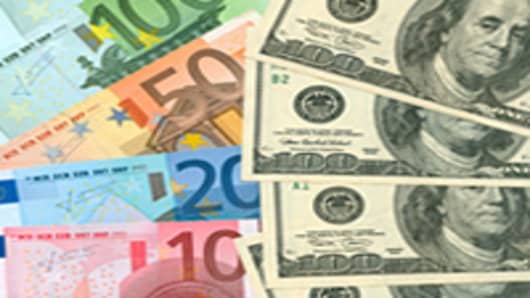The dollar should weaken further against the euro now that European interest rate hikes look inevitable, but the euro's gains may ultimately be limited if raising rates hurt the euro zone's weakest members.
European Central Bank President Jean Claude Trichet stunned markets Thursday when he said the ECB could raise rates next month to thwart inflation from rising food and commodities prices. Trichet said a rate hike was possible but not a certainty. The euro immediately snapped higher, and forecasters began revising their outlooks for euro dollar.
"We were expecting hawkish comments from Trichet, but this signal goes far beyond what the market was anticipating," said BNP Paribas currency strategist Mary Nicola.
"We are looking for as early as the April meeting...our economists are expecting further rate hikes from the ECB. We're looking now for almost 2 percent" by the end of the year, she said.
The ECB earlier Thursday left the key lending rate unchanged at 1 percent. Trichet warned that "strong vigilance" was needed in order to contain risks to price stability, a signal to strategists that the ECB will move in the next couple of months.
Foreign Exchange Analytics strategist David Gilmore said that Trichet's comments reflect northern European monetary policy, meaning Germany, where economic conditions are far stronger than in the periphery.
"In the summer of 2008, the ECB raised rates, which in hindsight looked foolish because by September the world was ending," Gilmore said. "I'm not saying we are where we were in 2008, but there's a reason not to make policy around big swings in commodity prices."
Gilmore said he is raising his forecasted range for the euro from the current 1.30-1.40, to 1.35-1.45 and possibly a top of 1.50. "If anything, the pressure to exit the euro zone by the periphery is only going to grow, and the ECB moving this early on inflation, to me, underlines the conundrum," he said.
The euro traded as high as 1.3974 Tuesday. "I had thought we could go to 1.40. My sense is now that we might go through 1.40 and maybe to 1.43. If we go above 1.43, it won't be a big move. The market coming into this was sitting with a large euro position," said Brown Brothers Harriman chief currency strategist Marc Chandler.
"I think the market is going to be debating whether the hikes are in April or May, and we believe this is just going to exacerbate the peripheral problems," said Chandler.
"The market had been looking for two rate hikes, but with a knee jerk reaction, it's looking for three now. I suspect what's going on is the euro zone is going to slow down," he said. Chandler said the move makes the euro zone leader summit March 24 even more important.
"It's the self-imposed deadline for a plan to resolve the debt crisis," he said. Chandler said the solution would be debt restructuring, but that is not likely to be agreed, and therefore he believes problems will persist.
As a result, the dollar could regain some footing against the euro later in the year. "Maybe in the second half of the year, when the Fed is done with QE2 [quantitive easing], and the economy remains fairly strong and Europe slows down under the weight of higher interest rates," said Chandler.
The ECB's inflation fighting mode is opposite that of the Fed, which sees no inflation threat as of now, though Fed Chairman Ben Bernanke acknowledged this week he is watching rising oil prices. Economists don't see the Fed reversing its easing stance until next year. Its program to buy $600 billion in Treasury securities ends in June, and as of now, it does not appear likely to be extended.
"People are still looking at the message from the helm of the Fed, which is Bernanke, and rates aren't going anywhere," said Gilmore. "Lacker, Hoenig and Fisher are not making policy. It's lower dollar, and this run up in commodities prices is making a bad situation worse."
Questions? Comments? Email us at marketinsider@cnbc.com




